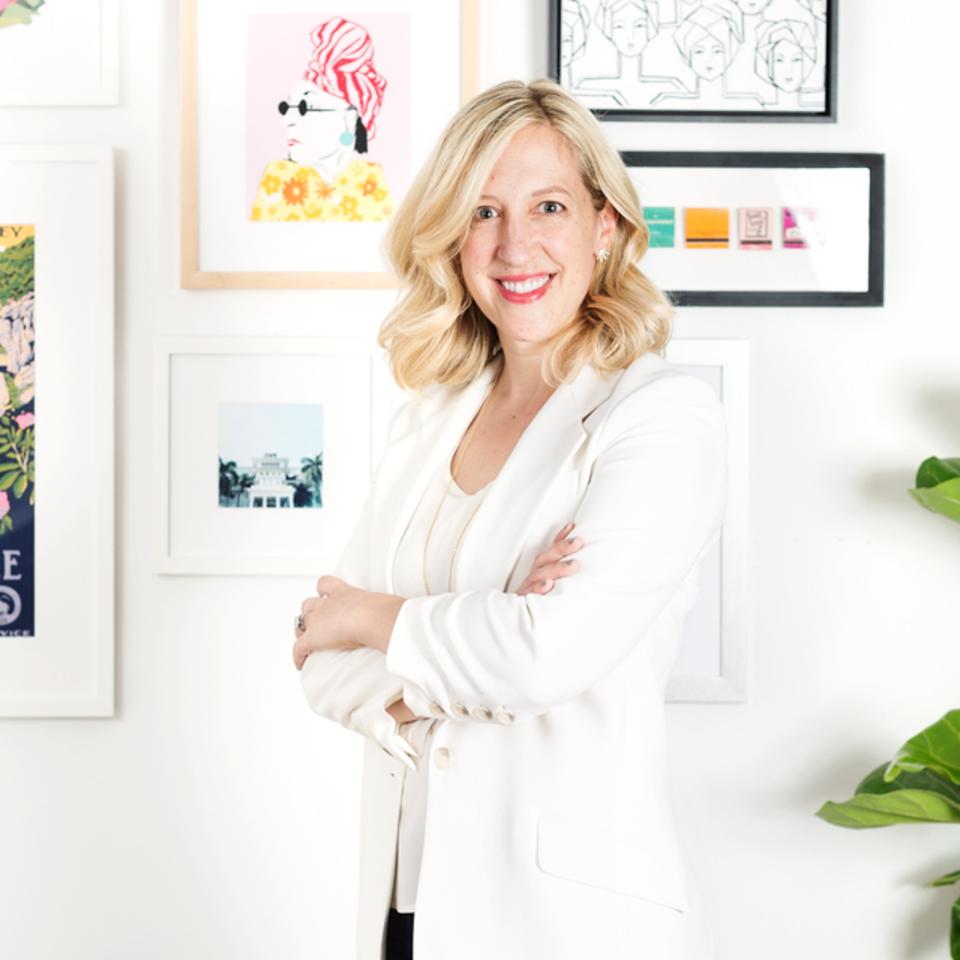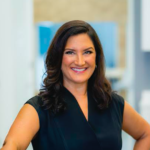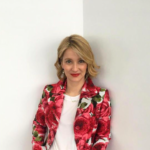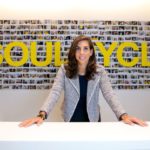Challenges are inevitable in our personal and professional lives. The difference between success and failure lies in how we react when confronted with an obstacle. Some people get pessimistic and give up, and some people remain positive and resilient. Your reaction can be a catalyst for a self-fulfilling prophecy. If you don’t believe you can overcome a challenge, you probably won’t. But if you are self-confident and determined, it’s likely you’ll get through the metaphorical roadblock. Susan Tynan, the founder and CEO of Framebridge, credits her success to resilience and self-confidence. “The difference between succeeding and failing may be just in the speed you can dust off, regroup and start running again,” she says. Tynan launched Framebridge, a simple custom framing company, in August 2014 and has raised $37 million in venture capital.
Prior to founding Framebridge, Tynan held senior product, operations and business development roles in several consumer technology startups. She also worked for the White House as a management advisor on technology and customer service issues and started her career at Accenture.

What inspired you to start Framebridge? What was your career path?
Framebridge was totally born from my frustrations getting things custom framed as a consumer. I framed four National Parks posters and somehow paid $1600, and the experience was intimidating and uninspiring. A few years later in Morocco, I saw a beautiful piece of original art and I thought: “I can’t buy that because I cannot frame it.” I realized then that the way the traditional industry worked resulted in prices that were too expensive for most people and most art. The market was unnaturally constrained. So I set out to fix it. I had worked in consumer technology, so I felt confident I could pull together the team to build the digital solution and the marketing. But I had to understand the actual framing, so I took a “vacation” from work and attended a framing course.
You previously worked at LivingSocial, The White House and Accenture as well as a number of startups. How did those experiences help prepare you for your role as founder and CEO of Framebridge?
I’ve worked in a few large, formal organizations, including Accenture and The White House budget office. I understand there are decisions that have to be made thoroughly and formally. But I’ve also had the fun of working for a number of startups, including LivingSocial, which was growing extremely rapidly during my time there. I learned that speed in itself is a competitive advantage. My primary function as CEO is to make a decision when needed so we can move on, and then to figure out how decisions like that one can be made faster by the team in the future. I love to debate the merits of everything, but I know that at the end of the meeting, or the week, we have to decide and move on.
What has been the biggest challenge and, on the flip side, the biggest reward of starting Framebridge?
The backlog of the summer of 2015! We’re stronger for it, but it was excruciating. We simply couldn’t keep up with demand and we went from a 48-hour turnaround to a 15-day turnaround. We all live for customer delight, so it felt awful. There were moments in the midst of it that we all wondered if this business really could scale. I smile realizing we did 10 times the volume that resulted in the backlog in the first three weeks of December 2016.
The biggest reward of starting Framebridge is meeting happy customers in “the wild.” I’m genuinely thrilled when I meet people who have used Framebridge, and I’m desperate to know what they framed and how it went. It’s my greatest joy.
What advice do you have for other women who hope to start their own businesses?
Believe in your ideas. If you are at all uncertain about yourself or your idea, the process of starting, funding and scaling your business will weed you out. You have to believe — and display that conviction — in your ideas, your ability and your ambition. There will be times as you scale the business that you need to believe for everyone who may falter like your team and your investors. That’s the role of the founder — to believe enough for everyone.
What is a workday as Susan like? Please walk me through a day!
I wake up and check my emails, customer feedback and sales. I walk my two little girls, ages eight and five, to school and then head into the Framebridge office in the District of Columbia’s Georgetown neighborhood. I take meetings and calls with investors, vendors, candidates and partners. I wander by everyone’s desk so I can look at photos from a recent photoshoot, samples of new packaging or new data analysis. I usually order lunch from Postmates because I’m scheduled back to back to back. My official work day ends at 7 PM and restarts around 9 PM online. I work a lot, but I genuinely love what I’m doing and I sincerely love the people on my team. I’m happiest if I’ve started the day with a SoulCycle and ended the day with a glass of wine with my husband, but some days are pretty much all work.
What are your responsibilities as founder and CEO of Framebridge?
I’m responsible for setting the strategic direction of the company, maintaining our focus on customer experience, managing our investor relationships and overseeing all core functions including marketing and operations.
What are the most important characteristics someone needs to have to be successful in your role?
Resilience — hands down. There are incredible highs and lows, and they happen within a single day. When you’re doing something that hasn’t been done before, it’s not all going to go smoothly. The difference between succeeding and failing may be just in the speed you can dust off, regroup and start running again. I’m obsessed with the OODA loop, a military term about a decision-making cycle: observe, orient, decide and act. In startups, you get dropped into new circumstances often, and the ability to get your bearings straight quickly is essential. I’m now almost defiant in the face of obstacles. I feel like: “I dare you to throw it at me.”
What are three characteristics you look for when you’re hiring a new team member?
I look for people who can think high and low, and these people are a rare breed. The challenge and the fun of a company at our stage is that your job must be highly strategic and also the most painfully granular and tactical on the same day.
When hiring, I look to see if you’re genuinely interested in what we do. You can have all of the functional skills in the world, but if you don’t care about our service or what we do for customers, it’s not going to work. Startups aren’t for cynical people.
What are the most important skills for doing your job and how did you develop them?
Prioritization, communication, creativity and tenacity. All day I am hit with an overwhelming number of requests. Today I had three 4 PM calls scheduled. I have to quickly assess and say, “What is in the best interest of the company?”
Communication is my primary duty — to team members, to investors and to customers. I communicate our priorities and our expectations internally and our story and our vision externally.
Creativity. I believe there is a solution for every problem, and we’re the team who has to figure it out. I pride myself in the speed at which I move to potential solutions when confronted with a challenge.
Tenacity. When people come to me with their startup idea, I can generally tell within minutes if they have a shot of getting it off the ground. And the merits of their idea have nothing to do with it. I’m simply assessing the founder’s energy level and drive.
What’s the biggest lesson you learned at work and how did you learn it?
I’ve learned to confront things head on — to really own my leadership position. There’s nothing I should watch happen from afar. If I don’t like the way something is going, I’m the one to intervene. There are times I think, “They don’t want to hear from me,” or “Everyone’s heard me state those things a million times.” But that’s my job: To continue to state what matters to the business, what our goals are and how we intend to get there.
What was the fundraising process like for you and what advice do you have for other people hoping to raise funding?
Fundraising is grueling. It’s a bizarre type of performance art — you enter the room with your story and all of your energy. You’re then asked a series of questions by people whose job it is to scrutinize. I’ve gotten better at trying to enjoy the process a bit — I get to tell more people about a business I’m insanely proud of. And I have rituals too — music, breakfast sandwiches, Power Poses the works. After each fundraising process, I realize how proud I am to be the creator. In every industry, there are creators and funders, and I’m meant to be a creator.
Congratulations on Framebridge’s new partnership with CB2. How did you select the five designers and curate the collection?
We have a wonderful opportunity to see a lot of art in our business. The five artists we featured in our CB2 collection felt fresh and energetic with a little wink. We believe people should be surrounded by things that catch their fancy, and we think this collection could spark most people’s.
What is one thing that you wish you had known when you were starting out your career?
Keep people informed of your progress! This was the biggest mistake I made early in my career. I would work on projects and be so excited for the big “ta da” reveal at the end. But it’s not enough to have a great deliverable, you need to keep people up to date on where you are and how you’re getting there. This applies to our investors today. Nobody wants a surprise — good or bad.
What is the best advice you’ve ever received?
I was really touched by Randy Pausch’s quote about “brick walls” in his “Last Lecture. Essentially, “brick walls” are there to keep out the people who don’t want it as much as you do. That’s been incredibly inspiring to me when I run up against my “brick walls.”
A variation of the same theme comes from Abby, my SoulCycle instructor: “You always have a little more.” It’s almost a relief to realize that whatever you need to get through will come from within you.
What is your business advice for other young professional women?
Realize you are learning something at every stop in your career. I always say that your career makes sense in hindsight. It’s sometimes hard to thread the story together as you go, but you will absorb valuable insights at each stop and you’ll develop skills you’ll reflect on later.
Image courtesy of Susan Tynan.































